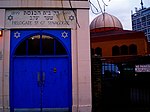London Interdisciplinary School

The London Interdisciplinary School (LIS) is an alternative higher education provider in Whitechapel, London. LIS was founded in 2017 and is the first new institution since the 1960s to hold full degree-awarding powers in the United Kingdom from inception. The School offers undergraduate and postgraduate degrees, as well as professional courses. LIS admitted its first cohort of undergraduate students in 2021, and will accept its first cohort of master's students in 2022. Students on the interdisciplinary undergraduate degree follow a problem- based learning model studying complex problems through interdisciplinary teaching. They will graduate with a Bachelor of Arts and Science (BASc) in Interdisciplinary Problems and Methods.
Excerpt from the Wikipedia article London Interdisciplinary School (License: CC BY-SA 3.0, Authors, Images).London Interdisciplinary School
Whitechapel Road, London Whitechapel
Geographical coordinates (GPS) Address Nearby Places Show on map
Geographical coordinates (GPS)
| Latitude | Longitude |
|---|---|
| N 51.5169 ° | E -0.0675 ° |
Address
People's Mission Hall
Whitechapel Road 20-30
E1 1EW London, Whitechapel
England, United Kingdom
Open on Google Maps









